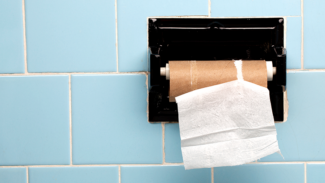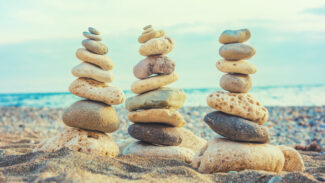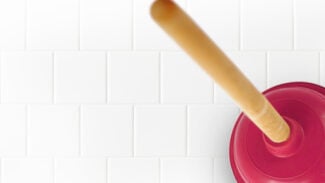Hiya Gorgeous,
Runs. Squirts. Trots. You know what I’m talkin’ about. We’ve covered constipation in the past so today, we’re exploring the other side of the toilet seat—diarrhea.
What is diarrhea? If you’re one of the rare few who haven’t experienced diarrhea, it’s usually a gotta-go-now feeling with a bowel movement that’s more liquid than solid. Sometimes people even experience nausea and vomiting.
Although diarrhea is often only a brief, uncomfortable and certainly inconvenient visitor, it’s usually just a sign that a particular food didn’t agree with you, your period is about to hit or you’re under some extra stress. When that’s the case, recovering is usually simple—an extra glass of water, some probiotics and easy-to-digest foods, like brown rice and cooked veggies, for a few days.
But, what about diarrhea that sticks around for more than 24 hours or so? Persistent and chronic diarrhea can be signs of something bigger that needs your attention. And, that’s what we’re going to address. People don’t always feel comfortable talking about this stuff so I’ll lay it all out for you. To start, let’s break down the different types of having to go-go-go:
What Causes Diarrhea
So what causes a fast trot to the pot?
Stomach Viruses
A stomach virus (like viral gastroenteritis or norovirus) is a common cause of diarrhea. It’s usually accompanied by the following symptoms:
- Nausea
- Vomiting
- Stomach cramps/pain
- Low-grade fever
This can develop after eating contaminated food or water, or sharing utensils with someone who’s sick. Because it’s viral, you can’t treat it with medication and usually have to let it run its course.
If you’re experiencing a stomach virus, preventing dehydration is key. So make sure you drink plenty of water to replenish lost fluids.
Foodborne Illnesses
Foodborne illnesses—more commonly known as food poisoning—can be caused by things like Salmonella, E. coli, Listeria, and Clostridium botulinum (better known as botulism), and Giardiasis. These toxins can deplete the good bacteria in your digestive system and trigger bouts of diarrhea. If you have food poisoning, symptions similar to a stomach virus start 6 to 24 hours after eating the contaminated food and last for less than 24 hours.
Medications
While antibiotics and other medications can treat diarrhea, they can also make diarrhea worse. If you’ve started a new medication and are consistently dealing with an upset stomach and loose stools, check with your doctor to see if there’s an alternative. If you’re taking antibiotics to treat an infection, probiotics have been shown to restore your system’s natural balance and soothe your gastrointestinal tract.
Food Allergies or Sensitivities
Another common reason that can cause to run to the restroom is being allergic or intolerant to the foods you’re eating. Those lactose intolerant loves know what I’m talking about. Dairy products like milk, cheese, yogurt, etc. can be a real party pooper and send you running for the toilet (just another of the many reasons you don’t need dairy in your diet).
The most common causes of chronic bloody diarrhea are inflammatory bowel diseases like ulcerative colitis or Crohn’s disease and celiac disease, marked by a profound gluten intolerance.
Artificial Sweeteners
Artificial sweeteners such as sorbitol, mannitol, and xylitol can be found in sodas, candy, and sugar-free gum—among other things—and can wreak havoc on your system. While you should avoid artificial sweeteners in general, if you consume them, see how your body responds.
Digestive Problems
Other common health conditions that can cause the runs include digestive disorders such as fat malabsorption (due to low levels of pancreatic enzymes) or carbohydrate malabsorption. Other less common causes include colon polyps or colon cancer.
It’s also worth mentioning that Irritable Bowel Syndrome (IBS) can result in ongoing diarrhea and often alternates with constipation and abdominal pain.
The Different Types of Diarrhea
Not all types of the trots are the same. There are actually three kinds of diarrhea: acute, persistent, and chronic.
Acute Diarrhea
According to The National Institute of Diabetes and Digestive and Kidney Diseases (NIDDK), acute diarrhea lasts 1-2 days and comes and goes pretty quickly, and is usually because of food poisoning, a viral infection (rotavirus in kids and norovirus in adults), stress-fests, PMS or could even be the result of jumping into a higher fiber or raw food diet too quickly. It generally takes a few days to recover and then a day or two more to form a normal bowel movement (BM) again.
Persistent Diarrhea
This one lasts an uncomfortable amount of ti
Treating Diarrhea 101
So if you experience diarrhea, what do you do? There are a few home remedies you can try unless an underlying condition requires treatment. Usually, all it takes to restore your healthy gut bacteria and get back on track is drinking plenty of fluids, eating foods that are more gentle on your digestive system and easing slowly into raw, high-fiber foods and green juices—and by slow, I mean no more than 1 extra serving of raw, high-fiber foods and 8 ounces of green juice per day until your body adjusts.
But when simple methods aren’t helping you return to normal bowel function, here are a few other things you can try.
Anti-Diarrheal Medication
Now, if you’re just suffering from mild diarrhea, you can just let it run its course. While I prefer more natural methods, if you need a quick fix, you can use an over-the-counter anti-diarrheal medication like Pepto-Bismol (which can also kill diarrhea-causing bacteria in your intestines) or Immodium (to, well, slow the flow).
Rice Water
Rice water is a simple yet oh-so-effective remedy to combat diarrhea symptoms. To make rice water, boil 1 cup of rice in 2 cups of water until the liquid becomes cloudy. Then, strain out the rice and drink the water. Rice water can bind the stool, leading to less watery bowel movements. Plus, it has the added benefit of helping you avoid dehydration.
Probiotics
Diarrhea is often caused by an imbalance of good bacteria and bad bacteria in your intestinal tract. Taking probiotics and eating foods that naturally contain probiotics can help restore balance in your system. Some probiotic foods to consider to boost your gut health include sauerkraut, kimchi, miso, microalgae and coconut kefir.
BRAT Diet
You’ve likely heard of the “BRAT Diet” which is a diet that consists of low-fiber foods like banana, rice, applesauce, and toast. A bland diet is less likely to upset your stomach while also having a binding effect on your stool. You can also add in other bland foods like saltines, potatoes, and even fruit juices (green juice, anyone?).
Antibiotics
Antibiotics can both be a cause and a treatment for loose stools. If your diarrhea continues to get worse, you may have a bacterial infection or parasite, usually from eating contaminated food. In this case, you should probably seek medical attention to receive proper care.
Stay Hydrated
If you experience symptoms of dehydration, (dry mouth, sleepiness, bad breath, muscle cramps, headaches and dark yellow urine), do whatever you can to get hydrated. Water is best, but if you’re struggling to keep it down, you can dilute it with a fruit juice like apple juice. Drinking a sports drink (or drinks with electrolytes) or a children’s oral rehydration solution like Pedialyte can also prevent severe dehydration.
You may be severely dehydrated if you’re extremely thirsty, experiencing confusion or unusual irritability, or have very dark yellow urine or skin that doesn’t bounce back when pinched on the top of your hand. This is when you need to see a doctor.
How to Prevent Diarrhea
Sometimes, you just can’t prevent an unfortunate case of the runs but avoiding it whenever possible is a win-win! Plus, it’s easy to take these simple precautions. The biggies include washing your hands periodically throughout the day—or using an alcohol-based hand sanitizer when necessary—taking a daily multivitamin to prevent deficiencies (plus a daily probiotic), staying hydrated and identifying food sensitivities
Avoid Foods that Worsen Diarrhea
If you’re experiencing diarrhea, there are certain foods you should avoid because they can make your symptoms worse. This can include things like:
- Caffeine (even healthy sources of caffeine, like green tea)
- Prunes or prune juice (but these are great for constipation!)
- Fried foods (and/or fatty foods)
- High fiber foods and gas-causing veggies (just temporarily!)
- Alcohol (which can have laxative effects)
You may want to avoid intense exercise temporarily, as movement is a natural mover and shaker of the digestive tract.
When to See a Doctor
Regardless of the type, if you have diarrhea and you’re experiencing weight loss and/or signs of dehydration, you should see a doctor as soon as possible.
Even if you’re not dehydrated, it’s time to pay a visit to your doc if your diarrhea lasts more than two days. He or she can run bloodwork to check for pancreatic enzyme levels, anti-gliadin antibodies present in celiac disease, vitamin deficiencies, parasites and even look at your digestive tract. Your wellness is worth the trip!
Please note that this article is not intended to be a substitute for professional medical advice, diagnosis, or treatment. Home remedies and over-the-counter treatments such as Pepto Bismol are not a substitute for warranted medical help for diarrheal diseases.
Get instant access to my Starter Kit + more tips for wellness straight to your inbox each week:
As we’re all aware, diarrhea can be downright dreadful. It’s also why I wanted to give you a better understanding of what it’s telling you about your body and how to prevent it when possible. I hope this info brings you greater health and less discomfort in the future.









Prilosec a.k.a Omeprozole is not tolerated by some. A year ago I was put on it and what followed was months of digestive challenges. I was tested for everything! Due to other complications, I was taken off. Probiotics and acupuncture got me back to normal. I didn’t put it together until a month ago! My Onc recommended 2 weeks of it to resolve acid reflux. One pill on the AM and !Blam! I was back into it. After a few days I realized this was exactly what happened the previous year. I looked up side effects and it confirmed my suspicion. Sure enough….after stopping the Prilosec, I was back to normal in 48 hours!
Similar experience with Prilosec!
Hi Kris
Thank you for this post. I have been a sugar-free vegan for 3 years and a vegetarian for 30 years. Diarrhea has been a life long problem for me – all the variants you covered. I have also had chronic gastric acid problems over the past 5 years. Last year was particularly bad for diarrhea due to an enormous amount of stress in my life – I was tested for everything you mentioned and had a colonoscopy/endoscopy (with 4 benign sessile colon polyps removed and evidence of Barrett’s esophagus ). The diarrhea persisted, until I switched to green juices for breakfast, lunch as usual and only ate a light snack for dinner (or supper). Wow!!!! My gastric reflux is barely noticeable and my poops are mostly floaters (sorry couldn’t help myself). The green juices eased digestion, as they are nutrient packed and hydrating they seemed to do the trick. So thank you for the post AND for introducing me and the world to green juices and juicing. You are a rock star and a goddess!
Would love to see your recommendations for reputable brand(s) of probiotics (and do you also use prebiotics?) As usual, your posts are very helpful. Thanks for keeping us “going”!:)
Hi Barbara! As for probiotics, choose one that’s labeled as having “enteric coating”—this means that it has a special coating to help protect the healthy bugs from stomach acid, which can kill them before they reach your gut. I like Renew Life Ultimate Flora, Jarro-Dophilus EPS (Jarro-Dophilus is good for travel because it doesn’t have to be kept in a refrigerator) and Dr. Ohhira’s. As for prebiotics, if you’re getting plenty of fiber in your diet and it includes cooked or raw onions and raw garlic as well as occasional raw jicama or raw dandelion greens, you should be “fertilizing” your good bacteria without an additional prebiotic supplement. Hope that helps! xo, kc
Fabulous! Thanks a bunch, Kris:)
I’ve had loose stool for years , it’s not diarrhea, just watery . I take 3 TSP physillium twice a day to bulk it up . I’ve been tested for all that you have listed except for the level of pancreatic enzymes . I take a multivitamin daily and drink most days about 8oz. of a sparkling probiotic drink or Kumbucha .
Don’t forget, if you’ve had your gull bladder removed, it can also cause chronic diarrhea. Unfortunately, that’s what I deal with.
I used to have problems with it in the past. Looking back, a lot of it was stress related. Also, I was overdoing it with green smoothies…as wonderful as they are, too much of a good thing is still too much. I’ve now found a better balance in my diet and I know my morning ritual of prayer/journaling and meditation helps as well.
I have learned about proper human foods and the consequences of generations eating the wrong protein, dead tissue, acidic, processed, cooked diets. Humans are a tropical species that should be eating a diet of mainly fruit and leafy greens. Check out the Dr. Morse vids online and Prof Arnold Ehret’s works. We get well when we eat what we were meant to eat and use herbs and fasting to support our healing process.
Thank you for you information. I have had food sensitivity for years caused by only eating one meal a day…at night. I have found a way to determine if I have eaten something bad or if something else is going on. Eating iceberg lettuce and stuffing it down as much as possible will neutralize food poisoning etc. It work quickly and effectly so you know if you ate bad food. I try to be very careful eating chicken in resturants as it seems the easiest and most miss handled food.
My mom used to always recommend the BRAT diet for diarrhea. Banana, rice, applesauce and tea. Each has a different purpose and it really helps!
My mom always said this too, except it was toast instead of tea. 🙂 Dry toast, easy on the stomach I guess.
Oh that’s right it’s Toast! It’s been so long.
If your gallbladder has been removed, such as mine, then having to go about 25- 45 mins after eating is very common. What has helped with me is cutting out dairy, including cheese, and staying away from high fat foods (which stinks b/c they are more filling) – especially when traveling. Lots of vegetables and the BRAT foods (Bananas, rice, applesauce & toast) – though I would recommend eating an apple over applesauce for the natural sugar & more fiber. And not over eating to point of being stuffed. It would be fabulous for find tips for this specific problem as many adults have had their gallbladders removed.
Diarrhea is a common problem but rare of us know about its types, causes and the exact treatment beyond medicines. I read in several blogs that when you are suffering with diarrhea you should have to take some home remedies.like ginger,chamomile tea are useful for diarrhea. I hope these remedies would also be helpful to reduce it.
I have had very loose stools for about 20 years and have tried most things to stop it, even taking loperamide gives me the trots. I only eat vegetables, i don’t smoke, don’t drink, don’t have caffeine, e.t.c. I have a rectal ulcer so do you think this could be the cause or is eating vegetables everyday causing me a problem? I also cannot eat fruit and haven’t for years as it gives me chronic diarrhoea for days and days.